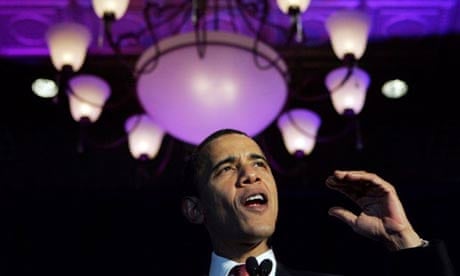Hillary Clinton is starting to lose her overwhelming lead in superdelegates, the Democratic party officials whose votes she is counting on to help her close the gap with Barack Obama. He has received a steady flow of backers in recent days while building a streak of 11 straight primary victories. After once leading Obama by a 2 to 1 ratio in the superdelegate chase, Clinton now has 241 to his 181, according to the latest Associated Press tally.
Most unnerving for Clinton is the trickle of superdelegates who have defected from her corner to Obama's. The shift comes as she failed to deliver a telling blow on him in their penultimate TV debate before the Texas and Ohio primaries on March 4.
Latest polling shows them separated by two percentage points in Texas, well within the margin of error, and seven points in Ohio. The Clinton campaign had hoped the debate would halt Obama's momentum. Instead she came under fire for allegedly plagiarising part of a speech by former candidate John Edwards. When asked about the potential influence of the superdelegates during Thursday night's debate at the University of Texas in Austin, both candidates appeared to pull back from the brinkmanship that has been developing over the issue.
"I think that it will sort itself out," Clinton said. "We will have a nominee, and we will have a unified Democratic party, and we will go on to victory in November."
Obama said that for the nomination to be decided by backroom deals would sully the process. "The American people are tired of politics that is dominated by the powerful, by the connected."
In New Jersey, where Clinton won by 13 percentage points this month, two superdelegates have shifted to Obama and nine Democratic leaders endorsed him. "Barack can help unite this country and help us embrace our diverse nation," said superdelegate Christine Samuels.
Superdelegates who represent areas won by Obama face pressure to declare for him. One Clinton superdelegate, Texas congresswoman Sheila Jackson Lee, said colleagues urged her to support Obama if he wins her district in the primary. But she said: "I want voters to be at ease that their votes truly count. But I also want them to respect each of us [superdelegates] individually for how we have perceived America's future to be."
More than half of 795 superdelegates had declared as of last week. As about 20% of a total of about 4,000 delegate votes, superdelegates are current or former elected officeholders or party officials; they vote according to their personal view, though they may face pressure to echo some presumed local or national consensus. When the primary delegate totals become evenly split, superdelegates and how they decide to use their vote become proportionately more important - and their choices are increasingly liable to be seen as "backroom deals".
The debate's most dramatic moment came when Clinton tried to exploit the charge of Obama's plagiarism. "Lifting entire passages from someone else's speeches is not change you can believe in," she said, "it is change you can Xerox." The line was met with boos from the audience.
Asked about the most testing moment in her life, she said: "Whatever happens we're going to be fine. You know, we have strong support from our families and our friends. I just hope that we'll be able to say the same thing about the American people, and that's what this election should be about." The line is similar to one used by Edwards in December.
